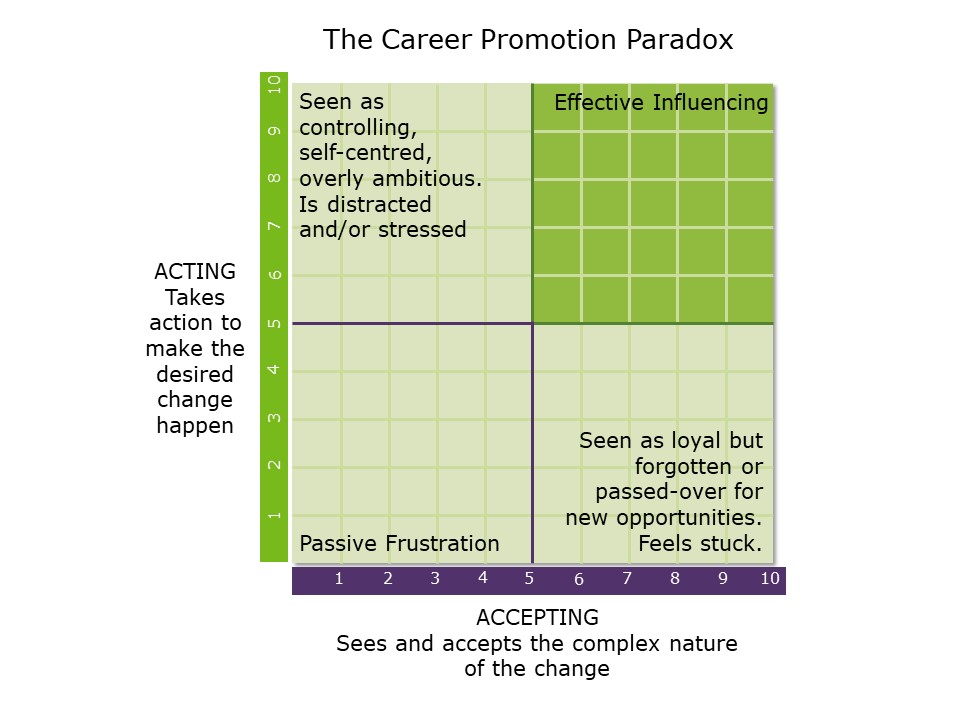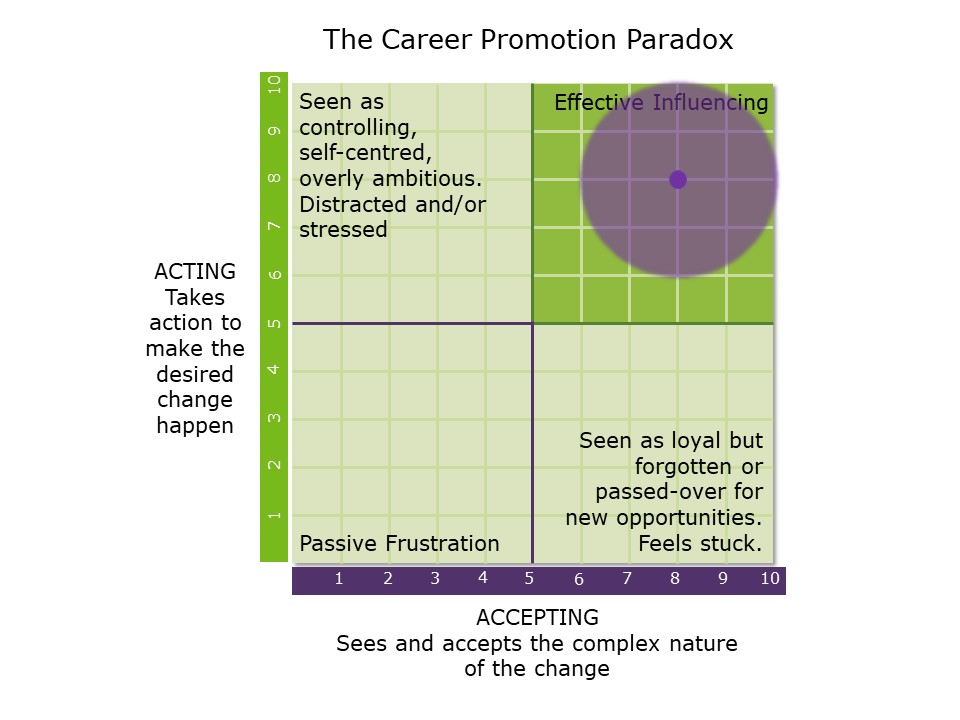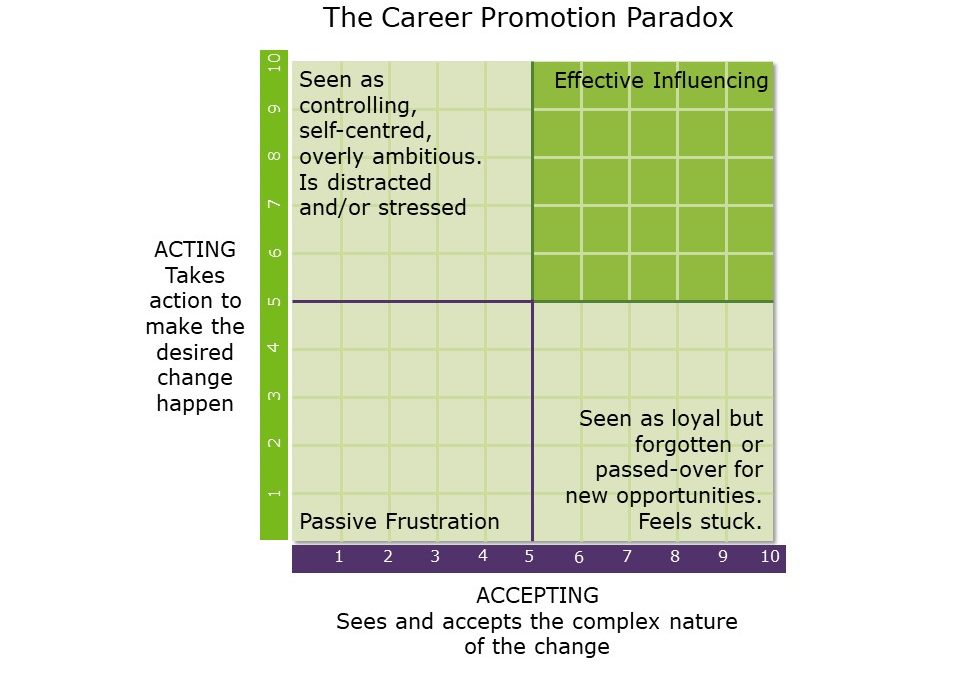Are you eager for your next promotion? Is it time for you to be recognized, to rise to a higher level of authority, and to broaden your scope in order to challenge your growth and development? And are you working in a complex organization where your next career step could be in many different directions, departments or even different countries?
Recently, I’ve worked with a number of clients in this situation, and I have noticed three common thinking patterns that limit their progress. The first two patterns are Linear Thinking and Socialized Thinking which I wrote about in the article called “Thinking Traps in Career Change”. The third thinking pattern I call the Career Promotion Paradox, which is shown in the diagram below.

A paradox is two traits which appear to be opposites but in fact are complimentary. In the Career Promotion Paradox, the opposing traits are Acting: taking action to make desired change happen (the vertical axis on the chart above); and Accepting: seeing and accepting the complex nature of the change (the horizontal axis on the chart above).
On face value, Acting and Accepting appear to be opposites in contradiction to each other. In reality, they work together. They complement each other in the manner of yin and yang, feminine and masculine qualities, both necessary balances to each other.
To read the chart, start by assessing yourself on a scale of 1 to 10 on each side of the paradox with 10 being high.
How do you rate yourself between 1 and 10 on taking action to make things happen in your career? This would include searching and applying for jobs, expanding your network in relevant ways, and persistently and clearly explaining what you are looking for to people with influence. To increase your accuracy, ask someone who knows you well to give you a score.
My score on Acting: _______
How do you rate yourself between 1 and 10 on accepting the complex nature of the change? How well do you understand the complexity of what needs to happen to provide you with a role you desire? How well do you communicate this understanding to others? How patient are you? How creative are you in thinking about possible future roles instead of complaining that you have not been offered what you want? Once again, to increase your accuracy, ask someone who knows you well to give you a score.
My score on Accepting: _______
Now plot your scores on each relevant axis to find the intersection on the graph. Your actual behavior will vary over a score of two from the intersection. The example below shows a score of 8 on both traits. The purple shaded area shows the likely behavioural range for this score.

If, like the example, you score 8 or higher on both traits, you are probably influencing effectively. You have found a way to integrate the advantages of both traits in the paradox. You are active in promoting yourself while supporting your reputation in the organization as a loyal team-player. By understanding and valuing both traits, you have the awareness and flexibility to take action while accepting the situation appropriately. Congratulations! Paradoxical thinking is complex and highly valuable. You are proving yourself worthy of a promotion and taking the necessary actions which will lead you there.
If you score lower than 8, but your scores on both traits are similar, you are still in balance. You can benefit from acting on all the suggestions below.
If your score is in the top left, it means you take a lot of action to promote yourself, but you do not accept the organization’s reality, including conflicting goals and other concerns that it faces. You may come across as self-centered, overly ambitious or trying too hard to control the outcomes to your personal benefit. With this approach you may also be wasting a lot of energy and creating unnecessary stress since you are ignoring the natural timing and rhythms of change. You may be unaware of more subtle processes that are required for change to happen. You may benefit from learning more about the processes and inter-related changes that are required for your promotion to occur. As you investigate more, look for alternative routes and creative options that could bring you the benefits you want while aligning with the organization’s complex needs. Consider talking to others who have made similar changes, taking notice of the normal timing of promotions and the complexity of role changes.
If your score is in the bottom right, you have a good understanding of the organization’s situation regarding how it fills the roles you could potentially play, and therefore it is easier to understand why the timing or circumstances of your role change may not meet your preferences. You probably come across as a loyal team player. However, if you do not sufficiently promote yourself within the organization, then it is likely that you would not be remembered when the right opportunity presents itself (since this could happen at some distance from you in the organization). You might be passed over for opportunities because others who are more vocal are seen as stronger or more needy candidates. You could benefit from explaining clearly what you are looking for, your needs, preferences, strengths and potential contributions, and connecting with more people who have relevant influence.
If your score is in the bottom left, it is quite surprising that you are reading this article. You are quietly suffering over your lack of career advancement without taking action nor understanding what is going on.
As you contemplate the meaning of your score, remember that the effect of both unbalanced approaches will depend on the organizational culture and how much it emphasizes self-promotion or humility and loyalty. Your ideal strategy for achieving promotion must take into account the organizational environment you are influencing.
Getting a non-linear promotion in a complex organization is a big challenge and a large developmental step. It will challenge you to know what you really want. And it will pu9sh you to act confidently in situations of uncertainty. The potential benefits of success are both career success and life fulfilment. The risks of failure are onerous if you keep repeating the same mistakes, not capturing all the lessons along the way. If you don’t have a smart and neutral thinking partner for navigating your career move, please talk to us to see if a career coach would be valuable for you.
The Career Promotion Paradox is inspired by the Harrison Assessments Paradox Graph, a model for assessing and developing complex thinking for the workplace.



